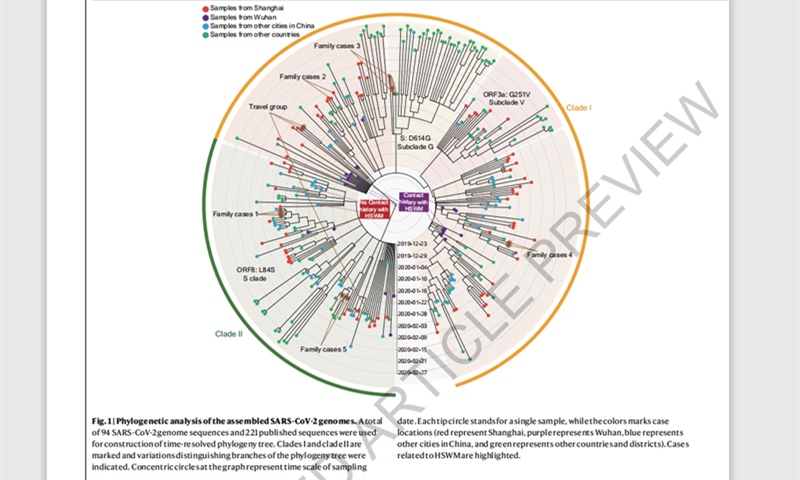Nature publishes Shanghai COVID-19 study that suggests determinants of COVID-19 severity seemed to stem mostly from host factors
By Huang Lanlan Source:Global Times Published: 2020/5/27 18:47:44

(photo: courtesy of the team)
Recent Shanghai-based research targeting local confirmed cases of the novel coronavirus (SARS-CoV-2) once again proved the attacks on a seafood market in Central China's Hubei Province for originating the virus are nonsense.The results of the study, published on the website of top academic journal Nature on May 20, implied the Huanan Seafood Market in Hubei's capital Wuhan may not be the birthplace of COVID-19, although the virus outbreak emerged in Wuhan had a strong link to contacts with the market.
Based on the analysis of 112 quality samples from 326 confirmed cases reported in Shanghai between January 20 and February 25, researchers found two major lineages (clade I and clade II) with differential exposure history during the early phase of the outbreak in Wuhan.
A Phylogenetic analysis of the samples saw that, six cases with clear contact history to the Huanan market were all clustered into clade I, while three cases diagnosed at the same period without the contact history were all clustered into clade II, as said by the authors.
The sequences of the Shanghai cohort were found throughout the two major clades and their subclades, suggesting multiple origins of transmission into Shanghai, said the Nature article titled Viral and host factors related to the clinical outcome of COVID-19.
There has been no direct evidence that the cross-species COVID-19 transmission originally occurred in the Huanan market, although it was a probable place for human-to-human transmission of the virus because of its relatively high crowd density, the authors said.
"The origin of the virus remains unknown based on current published data," the authors told the Global Times. "It still needs scientists' continuous effort in determining the intermediate host of the coronavirus, and carrying out comprehensive and detailed virus-tracing studies."
This finding echoes WHO and several COVID-19 studies of global research teams that have suggested COVID-19 origins unknown.
"...be so critical of China (for the virus) is not only unfair, but plainly incorrect and factually untrue," Richard Horton, the editor-in-chief of the British-based medical journal The Lancet, told media on May 1.
The study also found that the determinants of COVID-19 disease severity, which "seemed to stem mostly from host factors such as age, lymphocytopenia, and its associated cytokine storm," read the Nature article, adding that they are the key warning factors for some cases deteriorating to severe ones.
Even though 90 percent of the cases the Shanghai team studied were patients with mild symptoms, there were a few cases that could deteriorate to serious pneumonia and even deadly respiratory failure, the authors introduced.
"To reduce the incidence of severe cases, medical workers can assess the patients' situations based on these factors and make targeted treatment plans," the authors said.
Some targeted treatments for severe patients, including treatment of underlying disease, active anti-inflammatory therapy, convalescent plasma immunotherapy and tocilizumab on cytokine storm, have proved effective in clinical practice, they added.
The team consisted of members from Shanghai's scientific research and medical institutions including Shanghai Public Health Clinical Center and Ruijin Hospital affiliated to Shanghai Jiao Tong University School of Medicine.
Its study provides Chinese experiences in the fight against the virus to the world, the authors said.
Posted in: SOCIETY,FEATURE